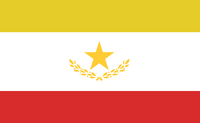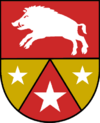Politics of Littland: Difference between revisions
mNo edit summary |
mNo edit summary |
||
| Line 27: | Line 27: | ||
| chief_judge = Gabriel Matthiasen | | chief_judge = Gabriel Matthiasen | ||
}} | }} | ||
{{Politics of Littland}} | {{Politics of Littland}} | ||
The '''politics of [[Littland]]''' takes place within the constitutional framework of a {{wpl|parliamentary}} {{wpl|republic}}. Littland is a republic whose {{wpl|head of state}} is [[President of Littland|President]] Morten Kristoffersen who leads the nations foreign policy. Littlands {{wpl|head of government}} is [[Prime Minister of Littland|Prime Minister]] Albert Simonsen who leads the executive branch of the [[Government of Littland|Littish Government]]. {{wpl|Legislature|Legislative powers}} are vested in the 325 seat [[Folkekammer]], the Littish parliament, which is elected every 4 years. The judiciary is independent of the executive and legislative branches. | The '''politics of [[Littland]]''' takes place within the constitutional framework of a {{wpl|parliamentary}} {{wpl|republic}}. Littland is a republic whose {{wpl|head of state}} is [[President of Littland|President]] Morten Kristoffersen who leads the nations foreign policy. Littlands {{wpl|head of government}} is [[Prime Minister of Littland|Prime Minister]] Albert Simonsen who leads the executive branch of the [[Government of Littland|Littish Government]]. {{wpl|Legislature|Legislative powers}} are vested in the 325 seat [[Folkekammer]], the Littish parliament, which is elected every 4 years. The judiciary is independent of the executive and legislative branches. | ||
Littish citizens enjoy individual and political freedom, suffrage is universal at age 18. | Littish citizens enjoy individual and political freedom, suffrage is universal at age 18. The population of Littland has a large minority with the Malskic people, predominantly living in the southern regions of Littland. After a county reform in 2004, the [[Malskic Autonomous Republic]] ("Malskland" for short) was established, giving the minority regions greater autonomy. It is still debated by some politicians whether this was necessary, as some tensions still remain between Litts and Malsks. These have been greatly alleviated with the since the [[Malskic Thaw]] began in 2002. | ||
Littland was rated a 'full democracy' in 2020 with a score of 8.12 on the {{wpl|Democracy Index}} | |||
==History== | ==History== | ||
| Line 42: | Line 43: | ||
==Executive== | ==Executive== | ||
Littland is a parliamentary republic, even if the President is responsible for foreign affairs. Most executive power lies in the government led by the Prime Minister. Forming a government is the task of the leader of the largest political party after an election, who also becomes Prime Minister. Any government must have the continued support of the parliament, who can engage a constructive vote of no confidence, to replace the government at any time. | Littland is a parliamentary republic, even if the President is responsible for foreign affairs. Most executive power lies in the government led by the Prime Minister. Forming a government is the task of the leader of the largest political party after an election, who also becomes Prime Minister. Any government must have the continued support of the parliament, who can engage a constructive vote of no confidence, to replace the government at any time. | ||
===President=== | ===President=== | ||
{{Main|President of Littland}} | {{Main|President of Littland}} | ||
The President of Littland has some noteworthy powers. Following the 1986 rewrite of the constitution however, the Presidents powers has been substantially reduced. The President is responsible for foreign affairs in cooperation with the [[Government of Littland|Government]]. Matters related to war and peace are handled by the Government however. The President serves as Commander-in-Chief of the [[Forsvarsstyrken|Littish Armed Forces]]. The President also formally appoints members of the Government including the [[Prime Minister of Littland|Prime Minister]]. They also appoint court judges. The veto-power of the President was changed in the 1986 Constitution and a Presidential veto can be overruled by the Folkekammer. | |||
===Prime Minister=== | ===Prime Minister=== | ||
{{Main|Prime Minister of Littland}} | {{Main|Prime Minister of Littland}} | ||
The Prime Minister of Littland is head of the Littish Government, as appointed by the President. The Prime Minister and the government is the highest executive authority in the country. The Prime Minister is formally appointed by the President following an election, to form a government. Should they not succeed, the President will appoint a different person. Should they succeed, the President will formally appoint the ministers and a new government is formed. As the Prime Minister is also a member of the Folkekammer, they can suggest legislation. | |||
===Government=== | ===Government=== | ||
{{Main|Government of Littland}} | {{Main|Government of Littland}} | ||
The Government of Littland is made up by the Prime Minister and the ministers of various ministries. Ministers are not required to be members of the Folkekammer, with the exception of the Prime Minister. It is the task of the Government to run the central administration of the country as well as carry out anything that the Folkekammer agrees on. Such as the annual budget, new laws, reforms and other changes to the function of state and society. Each ministry has relative independence from each other, but they all answer to the Prime Minister. | |||
There are currently 13 ministries in the Government. The number of ministries often vary by Government, however Justice, Defence, Health, Finance and Internal and Foreign Affairs have always been ministries. | |||
* Prime Minister's Office | |||
* Ministry of Internal Affairs | |||
* Ministry of Foreign Affairs | |||
* Ministry of Justice | |||
* Ministry of Defence | |||
* Ministry of Health | |||
* Ministry of Finance | |||
* Ministry of Energy | |||
* Ministry of Culture and Education | |||
* Ministry of Business and Trade | |||
* Ministry of Housing and Development | |||
* Ministry of the Enviornment | |||
* Ministry of Immigration and Equality | |||
==Folkekammer== | ==Folkekammer== | ||
| Line 58: | Line 75: | ||
The Folkekammer has 325 seats and is elected every four years based on proportional representation. Its tasks are to pass laws, approve the state budget and international treaties, and supervise the activities of the government. The 325 members are elected on the basis of proportional representation every four years. | The Folkekammer has 325 seats and is elected every four years based on proportional representation. Its tasks are to pass laws, approve the state budget and international treaties, and supervise the activities of the government. The 325 members are elected on the basis of proportional representation every four years. | ||
== | ==Elections== | ||
{{Main|List of political parties in Littland}} | {{Main|2020 Littish parliamentary election|2016 Littish presidential election}} | ||
{{elect|List of political parties in Littland|Elections in Littland}} | |||
Littland uses proportional representation which encourages multiple political parties in national politics. On a national level, Littland elects a President and a legislature. The President is elected for a six year term directly by the people. The Folkekammer, the Littish legislature, has 325 members and is elected for four year terms using proportional representation. Since 1953, no one political party has gotten a majority in parliament, thus requiring the need for coalition governments in order to form a government. | |||
In addition to the presidential and parliamentary elections, local elections are held every 4 years for [[Counties of Littland|county]] and [[Municipalities of Littland|municipal]] councils. | |||
==Administrative divisions== | ==Administrative divisions== | ||
{{Main|Counties of Littland|Malskic Autonomous Republic}} | {{Main|Counties of Littland|Municipalities of Littland}} | ||
{{See also|Malskic Autonomous Republic}} | |||
Littland has 16 counties including 1 capital region and 1 autonomous zone, those being [[Kaslund]] and the [[Malskic Autonomous Republic|Malskland]] | Littland has 16 counties including 1 capital region and 1 autonomous zone, those being [[Kaslund]] and the [[Malskic Autonomous Republic|Malskland]] | ||
{| class="wikitable" | {| class="wikitable" | ||
Revision as of 10:46, 24 August 2022
 Flag of Littland | |
| State type | Unitary parliamentary republic |
|---|---|
| Constitution | Constitution of Littland |
| Legislative branch | |
| Name | Folkekammer |
| Type | Unicameral |
| Meeting place | Tinghuset |
| Presiding officer | Inger Knudsen, Speaker of the Folkekammer |
| Executive branch | |
| Head of State | |
| Title | President |
| Currently | Morten Kristoffersen |
| Appointer | Popular vote |
| Head of Government | |
| Title | Prime Minister |
| Currently | Albert Simonsen |
| Appointer | President |
| Cabinet | |
| Name | Littish Government |
| Current cabinet | Simonsen II Cabinet |
| Leader | Prime Minister |
| Appointer | President |
| Headquarters | Tinghuset |
| Ministries | 13 |
| Judicial branch | |
| Name | Judicial System of Littland |
| Chief judge | Gabriel Matthiasen |
 |
|---|
| This article is part of a series on the politics and government of Littland |
|
|
The politics of Littland takes place within the constitutional framework of a parliamentary republic. Littland is a republic whose head of state is President Morten Kristoffersen who leads the nations foreign policy. Littlands head of government is Prime Minister Albert Simonsen who leads the executive branch of the Littish Government. Legislative powers are vested in the 325 seat Folkekammer, the Littish parliament, which is elected every 4 years. The judiciary is independent of the executive and legislative branches.
Littish citizens enjoy individual and political freedom, suffrage is universal at age 18. The population of Littland has a large minority with the Malskic people, predominantly living in the southern regions of Littland. After a county reform in 2004, the Malskic Autonomous Republic ("Malskland" for short) was established, giving the minority regions greater autonomy. It is still debated by some politicians whether this was necessary, as some tensions still remain between Litts and Malsks. These have been greatly alleviated with the since the Malskic Thaw began in 2002.
Littland was rated a 'full democracy' in 2020 with a score of 8.12 on the Democracy Index
History
Constitution
The current Constitution of Littland (Littlands Grundlov) is from 1986, after several changes were made to the power vested in the President, Folkekammer election threshold, responsibility of the Prime Minister among others. According to the constitution, legislative powers are vested in and executed by the Folkekammer. Governmental powers are primarily executed by the Prime Minister, while the President is responsible for leading foreign policy as well as serving as commander-in-chief of Forsvarsstyrken. Additionally, judges, ministers and other important positions are formally appointed by the President. The President has veto-power over legislation, however this can be overturned by the Folkekammer.
Executive
Littland is a parliamentary republic, even if the President is responsible for foreign affairs. Most executive power lies in the government led by the Prime Minister. Forming a government is the task of the leader of the largest political party after an election, who also becomes Prime Minister. Any government must have the continued support of the parliament, who can engage a constructive vote of no confidence, to replace the government at any time.
President
The President of Littland has some noteworthy powers. Following the 1986 rewrite of the constitution however, the Presidents powers has been substantially reduced. The President is responsible for foreign affairs in cooperation with the Government. Matters related to war and peace are handled by the Government however. The President serves as Commander-in-Chief of the Littish Armed Forces. The President also formally appoints members of the Government including the Prime Minister. They also appoint court judges. The veto-power of the President was changed in the 1986 Constitution and a Presidential veto can be overruled by the Folkekammer.
Prime Minister
The Prime Minister of Littland is head of the Littish Government, as appointed by the President. The Prime Minister and the government is the highest executive authority in the country. The Prime Minister is formally appointed by the President following an election, to form a government. Should they not succeed, the President will appoint a different person. Should they succeed, the President will formally appoint the ministers and a new government is formed. As the Prime Minister is also a member of the Folkekammer, they can suggest legislation.
Government
The Government of Littland is made up by the Prime Minister and the ministers of various ministries. Ministers are not required to be members of the Folkekammer, with the exception of the Prime Minister. It is the task of the Government to run the central administration of the country as well as carry out anything that the Folkekammer agrees on. Such as the annual budget, new laws, reforms and other changes to the function of state and society. Each ministry has relative independence from each other, but they all answer to the Prime Minister.
There are currently 13 ministries in the Government. The number of ministries often vary by Government, however Justice, Defence, Health, Finance and Internal and Foreign Affairs have always been ministries.
- Prime Minister's Office
- Ministry of Internal Affairs
- Ministry of Foreign Affairs
- Ministry of Justice
- Ministry of Defence
- Ministry of Health
- Ministry of Finance
- Ministry of Energy
- Ministry of Culture and Education
- Ministry of Business and Trade
- Ministry of Housing and Development
- Ministry of the Enviornment
- Ministry of Immigration and Equality
Folkekammer
The Folkekammer has 325 seats and is elected every four years based on proportional representation. Its tasks are to pass laws, approve the state budget and international treaties, and supervise the activities of the government. The 325 members are elected on the basis of proportional representation every four years.
Elections
Littland uses proportional representation which encourages multiple political parties in national politics. On a national level, Littland elects a President and a legislature. The President is elected for a six year term directly by the people. The Folkekammer, the Littish legislature, has 325 members and is elected for four year terms using proportional representation. Since 1953, no one political party has gotten a majority in parliament, thus requiring the need for coalition governments in order to form a government.
In addition to the presidential and parliamentary elections, local elections are held every 4 years for county and municipal councils.
Administrative divisions
Littland has 16 counties including 1 capital region and 1 autonomous zone, those being Kaslund and the Malskland
| The State | County | Municipality |
|---|---|---|
| Defence | Hospitals | Eldercare |
| Higher education | Secondary education | Primary education |
| Highways | Major roads | Local roads |
| Central administration | Museums | Basic utilities |
| Postal service | Benefits | Childcare |
| National parks | Waste disposal | Local permits |
Foreign Relations

